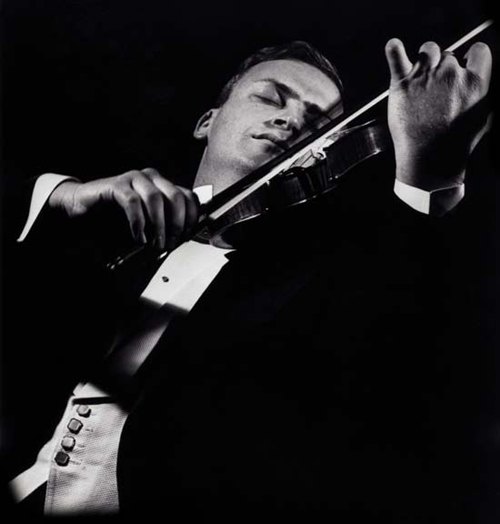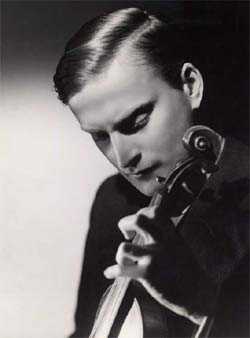
Genie in a Bottle
March 5, 2009
I ran into the violinist, Jennifer Koh, not long ago. Jenny is a highly gifted young musician who happens to have a keen interest in string players of old. At some point, our conversation turned to Yehudi Menuhin, one of the great violinists of the twentieth century. We talked about Menuhin’s instantly recognizable style, the emotive quality of his playing, and the powerful effect it has had on both of us. I asked Jenny whether she knew Menuhin’s recording of Schumann’s Second Violin and Piano Sonata, Opus 121 in D minor. She shook her head. That was all the encouragement I needed to launch enthusiastically into a description of the way Menuhin began the work: those defiant first chords leaping out of the violin, that long, sustained note easing into a mini cadenza in which Menuhin seems to plead and then even sob. “It’s enough to undo you,” I concluded, lifting my eyes upward to the heavens where Menuhin undoubtedly now resides (Menuhin was born April 22, 1916 and died March 12, 1999). Jenny’s face lit up when I offered to lend her my recording—an old 78 RPM (revolutions per minute) set that I hadn’t heard in years.

The Schumann recording came to me from my friend, Rosalie Berner, around 1970. Rosalie had decided that as much as she revered her old 78 records for sentimental as well as artistic reasons, it was time to throw them out. The bulky albums were only gathering dust and furthermore, almost all of them had been reissued on long playing 33 RPM records that were lighter, played as much as thirty minutes of music on a side rather than the previous limit of five, and were much easier to store. Rosalie offered me tea, cookies, and a last chance to look the records over.
Menuhin’s recording of the Schumann Sonata with his younger sister, Hephzibah Menuhin as pianist, was among the treasures that I brought home with me that day. I listened to the Schumann over and over again on my old 78 RPM player—drawn to the melancholy nature of the work and Yehudi Menuhin’s uncanny ability to enter into its dark world. He seemed to cry out for all that ailed Robert Schumann and the rest of humanity. But there was a down side to Menuhin’s performance. The sonata took up four cumbersome two-sided records, insuring that I had to get up and change records before and during each of its four movements. At some point, I set all of Rosalie’s old records including the Schumann aside in favor of LPs and a few years later for CDs, the even lighter and smaller new technology.
Now, thirty years later, promising Jenny Koh the Menuhin record turned out to be easier than actually finding it. It took me a good two hours rummaging through bookcases and closets to finally locate the stack of Rosalie’s old 78s in an out of the way corner of my garage. Unused and unseen for decades, they were covered with dust and smelled unpleasantly of mildew. I shook my head in sadness. These discarded 78s were the medium of a whole era of musicians who had been my idols, my mentors. Their artistry embedded in these discs had been the siren song that first drew me to music. I spotted the Menuhin album quickly and opened it with trepidation. What would records exposed for so many years to extremes of intense summer heat and bitter winter cold sound like? One by one, I pulled the records gingerly out of their sleeves. Amazingly, all were unbroken, unscratched, and even unwarped. These records could still be played.
I brought the album to my old friend, the pianist Lincoln Mayorga, and asked him if he would make a CD copy for Jenny. Lincoln is the only person I know in a world of ever changing recording mediums who still listens to his 78 RPM records. Lincoln looked the album over and noticed something I had missed. “M233,” Lincoln said, pointing to the album’s spine. “That’s the catalogue number. Early. I would guess that Menuhin recorded this in London at the Abbey Road Studios sometime during the 1930s. He must have still been a teenager.” Lincoln was right on the money as it turned out. The recording took place at the Abbey Road studios in July, 1934 when Menuhin was eighteen years old. Lincoln pulled the first record out of its sleeve and held it lovingly in his hands. “This,” he said with a certain amount of reverence, “is a slice of life. What you will hear on this record is what the Menuhins actually played without the splices or other monkey business of more modern day technology. And look here.” Lincoln showed me a tiny roman numeral etched into the record’s surface. I could barely make out the number five. “This tells you which take they finally decided on. Yehudi and Hephzibah recorded this particular side at least five times, maybe more.”
Lincoln slipped an empty disc into his CD player, placed the first 78 side on his old turntable, pressed a couple of buttons, and then ever-so-gently lowered the arm and needle onto the revolving platter. We would be able to listen while the recording was being transferred onto CD for Jenny.

My memory of Menuhin’s playing had not failed me. Out came those first arresting chords and that most plaintive cadenza. Except for the eight times that Lincoln changed record sides, we sat more or less in silence while Yehudi Menuhin with able assistance from his sister, Hephzibah, pulled at our heart strings as he played. My father had heard the very young Menuhin still in short pants perform both the Beethoven and Brahms violin concertos with orchestra. He said people cried as Menuhin played. Dad had the feeling that an old and very wise man dwelled in Menuhin’s tender frame. Even at the ripe old age of eighteen, Menuhin conveyed something in the Schumann Sonata that one would assume was born out of life experience. It was enough to make you believe in reincarnation.
Menuhin’s recording was made all the more remarkable by the journey it had made through heat, cold, the passage of time, and utter neglect. First for Rosalie Berner, then for me, and now for the two of us listening raptly, Menuhin played on command as if he were a genie released from his bottle. Not only that. He would immediately play again if we asked him, in the middle of the night as well, and in another thirty years from now even if I callously relegated him once again to my dusty garage. He would play the Schumann Sonata willingly, obediently, and without complaint, and each time he would touch us in the process.
Rosalie’s grandson, Anthony Berner, and I had lunch shortly after we had transferred the Menuhin record to CD. I told him about the record’s bumpy journey. Anthony lifted an eyebrow and delivered a shocker. “You know, of course, that Menuhin was in love with my grandmother and even proposed to her.” For whatever reason, the proposal hadn’t led to marriage, but did this genie offer Rosalie something more than sheer artistry each time she placed the Schumann record on her turntable and ordered him to perform?
I sent the Menuhin CD to Jenny and got a package in the mail from her a couple of weeks later. In it was a note of thanks but also a surprise CD with three different recordings of Beethoven’s tenth Violin and Piano Sonata, Opus 96 in G Major, by artist violinists and pianists from the past. Thanks to Jenny, these new genies now reside in my living room. They wait patiently and without complaint night and day, rain or shine to make glorious music on command.
Subscribe
Sign up to receive new stories straight to your inbox!





































































































































































Comments
I would love to hear that Schumann recording; I know only the A minor sonata, which I love. Speaking of making the music cry, while attempting to read this blog, I was severely distracted by the tearfully beautiful violin playing coming out of my computer from the Dvorak “American” Quartet. and then the G minor Bach sonata…. You really should do this fiddle playing professionally!
Is it Menuhin or is it Schumann?
A musician’s greatness is defined by the ability to convey to the audience the composer’s heart and soul, a legacy of emotions. Menuhin and Oistrahk stand at the head of a long line of magnificent violinists who allow the composers to live again and again.
Can anyone hear the opening notes of the great concerti of Tchaikovsky, Brahms, Beethoven, Sibelius etc. and not be instantly transported to their world of love and sorrow… and ultimately their victory over the challenges of life?
Menuhin in my experience was a loving gentle man bursting with musical talent, sensitivity, and flexibility. I’ll always remember the day decades ago when I played Lalo for him, not too well :-) and then went to the Opera House to hear him play the Beethoven concerto.
He wore a white jacket that night and played his magnificent Strad the Swallow. Never can the 2nd mvt. be played more beautifully than Menuhin played that night. As an impressionable youngster, I was totally involved in the performance from first note to last. And Menuhin lived the music every moment he was on stage.
Even my teacher, one of the orchestra’s leading players, grumblingly admitted it was damned good playing. Not a Menuhin fan him! But then and years later as I stepped into my role as a orchestra violinist, I recognized Menuhin’s interpretive genius.
Long live music! Long live recordings! Long live all things Violin!
Thanks for your thoughts, Arnold.
dear Arnold,speaking of crying,your cavatina[op. 130] make me cry,specially the one on the RCA recording.
Ron.
Thank you so much for this. I just found the recording on YouTube and can’t stop listening.
Leave a Comment
*/